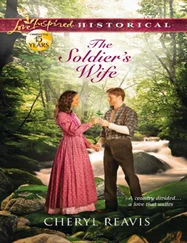Abiah was frantic now, running her hands among the remaining sheets. Her fingers finally touched cold metal. She dragged Guire’s Colt revolver out, carrying it with both hands to the fireplace—the only source of light—so she could see. She had hated the thing, hated when Guire insisted that she learn to shoot it because he was away at school and she and their mother were isolated and alone.
She felt so weak suddenly, and she went down on both knees on the hearth, breathing heavily. The revolver slid out of her hands. She stayed where she was, her head bent low until she could pick up the gun again. Then took a deep breath and held it closer to the firelight, where she could see. It was still loaded.
She forced herself to her feet again, holding on to the furniture and then to the wall to get to the door. She didn’t hesitate—she could hear Gertie sobbing still. Abiah opened the door wide and stepped unsteadily into the hall. The too-long sleeve of her nightgown kept sliding down and covering the Colt.
There was no one in the hallway now.
She heard Gertie give a muffled cry somewhere to her left. Something fell and broke. Abiah went in that direction, holding the revolver with one hand and leaning heavily against the wall with the other. She had to keep stopping to rest, but she was determined to go on.
The man had Gertie down on the kitchen floor, and he was so intent on what he was doing that he didn’t hear Abiah. She brought the revolver up and pulled back the hammer. It was that noise that got his attention. He abruptly looked around. Only one lamp had been lit, and she couldn’t see his face distinctly.
“Move away from him, Gertie,” Abiah said, stepping closer to the end of the kitchen table so she could lean against it.
Gertie tried to stop crying, tried to cover herself. She made an attempt to scramble aside, but the man caught her wrist and struck her hard.
“Stop it!” Abiah cried.
He didn’t stop. Gertie was struggling, he hit her again.
“Stop it! I mean it!”
When he raised his hand the third time, Abiah pulled the trigger. The revolver misfired. She gave a soft cry of alarm and fumbled to pull back the hammer. Her sleeves were in the way. Her hands were shaking, but she held on.
The revolver misfired again.
“I never knew whores stuck together,” the man said, still holding Gertie down.
But then he was getting slowly to his feet. Abiah didn’t dare take her eyes off him.
“What are you going to do now, whore?”
“I’ve got…four more chances…to send you to hell,” Abiah said. Her entire body trembled from the physical strain. “If you don’t get out of here, I intend to use them…all.”
“She owes me, damn you!” the man said. “Come to think of it, so do you.” He lunged suddenly in Abiah’s direction, taking her completely by surprise, but not before she pulled the trigger again. There was a loud roar this time, and the man reeled away from her and fell heavily on the floor. Gertie screamed, and Abiah collapsed against the rough kitchen table and slid to her knees. The heavy revolver tumbled out of her hand. She had to cling to the edge of the table to keep from falling on her face.
“Oh, Miss Abiah! What have you done?”
Abiah found Gertie’s question entirely beyond her comprehenion. She still held on to the edge of the table, trying hard to stay upright, trying to stop trembling.
It was raining again. She could hear it.
How strange, she thought, that she should take note of that.
Happy is the bride the sun shines on today.
And she suddenly thought she heard Guire’s voice.
“What?” she whispered.
I mean it, Abby. Don’t you ever aim this gun at anything if you don’t mean to kill it.
“What?” she whispered again. “What did you say?”
“Miss Abiah, stand up! We have to get out of here!”
“No, I can’t, Gertie—”
“You have to! Get up! Now!”
Abiah tried to do what Gertie wanted. She pulled hard on the edge of the table in an effort to get to her feet. The man was no longer lying on the floor where she had seen him fall. She closed her eyes for a moment, trying to understand. She didn’t know what was real anymore. And at this point, she had no idea which would be worse—to be out of her head again and to have imagined it all—perhaps even her marriage to Thomas—or to have killed a man.
She looked up at Gertie. One eye was bruised and swollen nearly shut.
Not a dream then.
“Is he…dead?” Abiah asked, her voice trembling.
“Carl says not,” Gertie said.
“Carl?”
“He’s the hired man. He came when the gun went off.”
“I…really shot someone?”
“Close enough.”
“Where—where is he?”
“I don’t know. Come on, Miss Abiah. We have to get out of here.”
“No, we have to let somebody know what happened. Mr. Wilson, or his wife. Somebody needs to know about that man.”
Gertie gave a sharp sigh and stopped pulling on her arm. “Miss Abiah,” she said in exasperation, “Zachariah Wilson is that man.”
“What?” Abiah said, no longer trying to get up.
“You shot our landlord, Miss Abiah. Not that anybody is going to believe that even if you tell them—not with the likes of me standing right here beside you.”
“But—”
“Miss Abiah, there ain’t no use talking about it. We have to get out of this house. We don’t wait until the rain stops. We don’t even wait until the sun comes up. We go. Understand?”
“Mind what you do with your face, Cap.”
Thomas gave the sergeant a look in spite of the admonishment. The effects of his groomsmen’s brandy had long since worn off, and the last thing he needed was to be instructed on his demeanor.
“The boys are ready to drop where they stand, sir,” La Broie persisted. “You got to show them it ain’t as bad as they think it is.”
“Oh, it’s nowhere near as bad as they think it is,” Thomas said. “It’s goddamn worse.”
He had his own struggle to keep from dropping, and perhaps the only deterrent was the fact that he was standing in mud—and who knew what else—nearly to his knees. The roads had become completely impassible. He had long since given up trying to ride his exhausted mount; a horse mired in mud to its belly was completely useless. He walked like the rest of them, and every muscle in his body ached. He was shivering with the cold. He was hungry. And the rain. God, the rain.
The beginning of their little jaunt to surround the Confederates and utterly vanquish them began auspiciously enough, but by the first evening, the weather turned foul and stayed that way. By now they had been standing in a downpour for what seemed like hours, waiting for somebody up the line to decide what this dog-wet and mud-caked excuse for an army was going to do, and all the while it was common knowledge that they were giving Lee and his crowd the biggest laugh of their military careers.
There was a loud commotion up ahead, shouts and the neighing of distressed horses—another overturned baggage wagon. Thomas took a moment to indulge himself in a colorful assessment of General Burnside’s family tree.
“He is that, sir,” La Broie said appreciatively. “Indeed he is.”
“Let’s go, La Broie. And you can keep your remarks to yourself,” Thomas said, forcing himself to begin a pass along the line to hand out words of encouragement he didn’t begin to feel.
“Sir—” La Broie said.
“I know, La Broie! Mind my face.”
Thomas had an admirably disciplined company, now—something he could only accredit to La Broie’s reputation as an Indian fighter and his consummate ability to put the fear of God into a man with hardly more than a look. Unlike some of the other, more demoralized companies, this one was all present and accounted for. And it was safe to say that La Broie was the reason the men still had their “gum blankets” as well, that all-purpose piece of equipment that could be worn to keep the rain off or slept upon as a barrier to the wet ground.
Читать дальше












